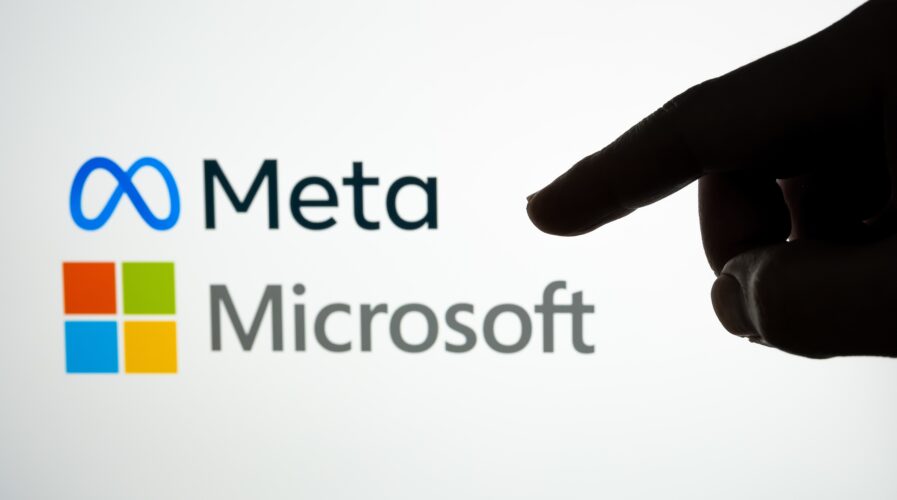
(Source – Shutterstock)
Meta and Apple squaring off in the metaverse world
- Zuckerberg said that Microsoft and Apple are in a “very deep, philosophical competition”.
- Meta is positioning itself as the more open, cheaper alternative to Apple.
The number of players in the metaverse world is substantial, and new businesses are entering it on a nearly regular basis. There were many small-scale players in the metaverse at first, but consolidation eventually took place as time went on, as was only inevitable.
Also, by the looks of things, it appears that Microsoft and Apple are currently in a competitive position.
According to a recent report by The Verge, Mark Zuckerberg claimed that his company and Apple are engaged in a “very deep, philosophical competition” to build the metaverse, indicating that the two tech behemoths are prepared to square off in the market to sell hardware for augmented and virtual reality.
“This is a competition of philosophies and ideas, where they believe that by doing everything themselves and tightly integrating that they build a better consumer experience,” Zuckerberg said of the brooding rivalry. “And we believe that there is a lot to be done in specialization across different companies, and [that] will allow a much larger ecosystem to exist.”
In addition, Zuckerberg stated that Meta would portray itself as less expensive, and more open in comparison to Apple, which is anticipated to introduce its mixed reality headset as early as January 2023.
According to SoyaCincau, Apple’s headset will have 16GB of RAM in addition to the new M2 CPU, potentially indicating a higher level of performance than the Meta Quest 2. Comparatively, that headset has the Snapdragon XR2 Platform and 6GB of RAM.
Is VR headsets leading the metaverse world?
Speaking of headsets, Meta Platforms Inc. recently announced that it would increase the cost of its Meta Quest 2 virtual reality (VR) headset by around $100 starting in August, even as the business gets ready to introduce a replacement gear later this year.
The retail prices for Quest 2’s 128 GB and 256 GB variants, according to Meta, are $399.99 and $499.99, respectively. Additionally, it increased the cost of several accessories and refurbished products.
“We’re making a change that will help us continue to invest for the long term and keep driving the VR industry forward,” Meta said in a statement, adding that users have spent over $1 billion on Meta Quest apps.
This isn’t the first time that Zuckerberg showed his interest in AR and VR. When Mark Zuckerberg originally discussed his ideas for the metaverse in October of last year, he was very clear about expanding beyond the current social media experience and seamlessly integrating VR and AR into its own apps and services. The business declared that it would hire 10,000 engineers to focus on creating this digital arena in order to realize this objective.
The interest that Mark Zuckerberg has shown in augmented reality and virtual reality is not new. When Mark Zuckerberg originally unveiled his ideas for the metaverse in October of last year, he was very clear about expanding beyond the current social media experience and seamlessly integrating VR and AR into its own apps and services. The company declared that it would hire 10,000 engineers to focus on creating this digital space in order to realize this objective.
Zuckerberg appears to want to position Meta as the Android to Apple’s iOS if VR and AR do become as popular as he anticipates. There is a similarity to be drawn between Google’s Android and Meta’s Quest headgear, which already permits side loading of apps that have not been authorized by Meta’s VR app store.
Since Facebook rebranded to Meta, the metaverse has attracted considerable attention from tech behemoths including Microsoft, Roblox Metaverse, and Nvidia Omniverse, with a market opportunity that might total up to $800 billion by 2024.
Despite this, Meta recorded a drop in revenue for the first time. According to a report by New York Times, Meta’s revenue for the second quarter was US$28.82 billion, down from US$29.07 billion a year earlier. Profit was US$6.69 billion, down 36% from a year earlier. Wall Street analysts had predicted profits of U$7.04 billion on revenue of US$28.9 billion, according to data compiled by FactSet.
READ MORE
- Strategies for Democratizing GenAI
- The criticality of endpoint management in cybersecurity and operations
- Ethical AI: The renewed importance of safeguarding data and customer privacy in Generative AI applications
- How Japan balances AI-driven opportunities with cybersecurity needs
- Deploying SASE: Benchmarking your approach


